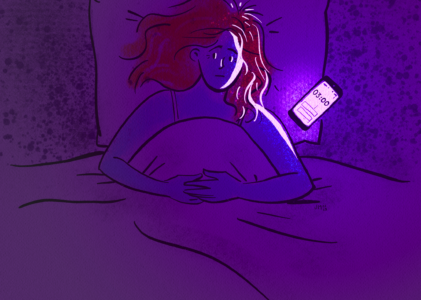Why does this happen like clockwork? The answer may surprise you.
You wake suddenly from deep sleep. You feel alert yet confused. Is it morning? Should I get dressed? But wait, it’s still dark outside… You look at the clock and your heart sinks. It’s 3am and you’ve gotten only a few hours of sleep. Why does this keep happening?!

Illustration by Joseph Moore
What’s so special about 3am?
Like most things involving biology, sleep is complicated. It relies upon a delicate interplay of hormones, rhythms, stages and shifts. As it turns out, certain biological changes that can affect sleep tend to occur at around 3am.
Sleep Cycles
One of the factors that may cause you to wake up too early is the shift from deeper sleep to lighter sleep.
A typical sleep cycle begins with light sleep and progresses to deep sleep and then to rapid eye movement sleep (REM) sleep, when most dreaming occurs. While this cycle usually repeats four to five times per night, the amount of time you spend in each stage changes. In general, you’ll get the most non-REM deep sleep toward the beginning of the night and the most REM sleep toward the end. One consequence of this shift is that you can awaken more easily in the morning hours than you would soon after going to bed.
To make getting a full night’s sleep even more challenging, you spend less time in deep sleep and more time in lighter, less-restorative stages of non-REM sleep as you get older [1]. This makes it even more likely that you’ll wake up in response to a loud noise, because you feel hot or because of some other change in your environment or physiological state.
Cortisol
Speaking of physiology, another change that influences sleep is rising levels of the stress hormone cortisol. In addition to helping you run from a bear, cortisol also helps you wake up and stay alert.
Cortisol operates on a 24-hour internal circadian clock in which levels are typically highest in the morning and lowest in the evening. Specifically, cortisol levels tend to drop to the lowest point at around midnight and then begin to rise a few hours later, with small peaks at around 3am and 6am, and the largest peak between 8-10am [2].
Like other aspects of our bodies, cortisol levels, rhythms and reactivity may change in middle age. As compared to your young adult self, your middle-age body may release higher levels of cortisol at night and your circadian clock may shift so that cortisol peaks occur earlier in the morning [3]. Evidence also suggests that you may become more reactive to cortisol [4], which could make it easier for you to wake up in response to a small spike in cortisol (like the one at 3am).
Body Temperature
You’ve probably heard that keeping your bedroom cool at night can help you fall asleep. The reason for this is that your core temperature naturally falls in preparation for sleep. By helping this along, you may fall asleep faster and stay asleep more easily.
Conversely, a rising core body temperature can disrupt your sleep. Several hours before waking, your brain starts sending signals to gradually increase heat production and help you wake up [5]. If you’re doing the math, you may already realize that this process could start at around 3am.
Stress
Everyone wakes up multiple times a night as they cycle through different stages of sleep. When you’re sleeping well, you’re awake so briefly that you probably don’t even notice. However, add a little stress and a brief awakening may turn into a punishing expanse of time in which you’re too tired to get up but too wired to sleep.
Depression, anxiety or other mental health issues can also make it more difficult to sleep through the night. When something small wakes you up, you start ruminating about things you wish you’d done differently or begin worrying about all the things you need to do when you get up. Instead of falling quickly back to sleep, you look over at the clock and notice it’s 3am, again!
What to do about it
While you can’t change biology, you can take steps to improve your chances of falling back to sleep. These suggestions may help.
Prepare for tomorrow
Make your lunch, set out your clothes, put your keys and other important objects in a designated spot, and make a to-do list for all the other things you need to accomplish the next day.
The more prepared you feel for tomorrow, the more relaxed you may feel overnight.
Limit liquids
Limit the amount of liquid you drink starting at least two hours before bed. Many people find this challenging, but it really can help increase your chances of sleeping through the night.
Set your thermostat
Program the thermostat so that your bedroom is cool at bedtime. If you tend to feel hot in the middle of the night, you may want to set the temperature even colder during that time.
To make it easier to get out of bed in the morning, program the temperature to rise 30 minutes before you want to get up.
Eat a snack
If you tend to wake up hungry in the middle of the night, try eating a high-protein, low carb snack about an hour before bed. This could include things like a hardboiled egg, tree nuts, or deli meat.
Relax
Spend 30-60 minutes winding down before bed. Dim the lights, put away electronics and engage in soothing activities. This could include things like doing a jigsaw puzzle, building a model, reading a physical book, knitting, drawing, or coloring.
Before you get into bed, write down any concerns, worries or irritations that you have. Getting them out on paper before bed may make them less likely to pester you in the early morning hours.
When to seek help
If poor sleep makes it hard for you to function or causes you distress, it’s time to seek help. A checkup with your primary care doctor is a good place to start.
Chronic insomnia is generally defined as having trouble falling or staying asleep at least 3 nights per week for 3 months or longer, but you don’t have to wait until it gets that bad to seek treatment.
If you’re struggling with depression, anxiety, or mental health issues, it’s important to address those issues as well. Since mental health issues often contribute to poor sleep, treatment is likely to be most effective when you also work to improve your mental health.
Next Steps
There are numerous treatment options that may help you sleep more soundly. These include talk therapy such as cognitive-behavioral therapy and various types of medication. A trained, licensed mental health professional can help you develop an effective treatment plan.
If you struggle with sleep challenges, stress or mental health issues, call your doctor or contact Athena Care, for mental health care in Tennessee.
One of our Care Coordinators will help you get the care you need.

Rachel Swan, MS
Editor
Rachel has a Masters of Science in Clinical Psychology from Vanderbilt University, where she spent 16 years as a Research Analyst in the Psychology and Human Development Department.
*Prior to 2008, NREM sleep was divided into 4 stages.


